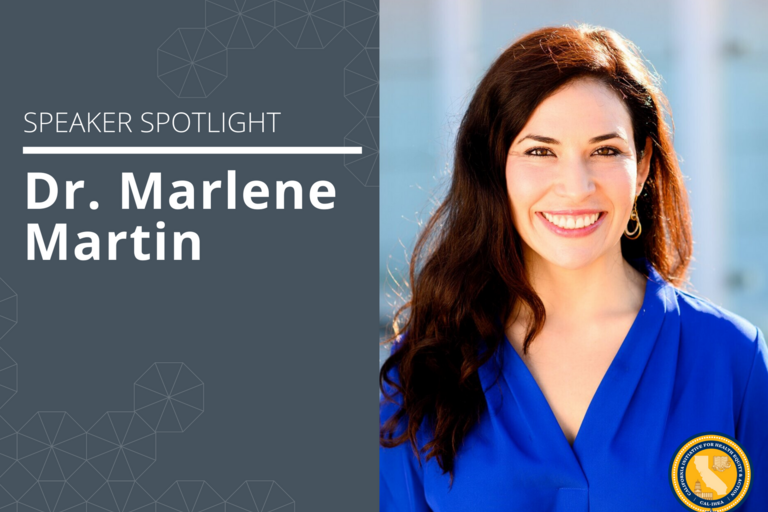June 30, 2020
Dr. Marlene Martin, Assistant Clinical Professor at the UCSF School of Medicine and hospitalist at Zuckerberg San Francisco General Hospital, spoke on our “Addressing the Latino Physician Shortage” panel last month. She articulated the ethical tensions that Latino physicians face, and explained the framework she utilizes to move beyond clinical care and towards patient advocacy. Here, Dr. Martin answered our questions about her background, COVID-19, and how she works to mitigate health inequity by improving care systems.
How has your background shaped your goals as a physician?
My identity as the daughter of hard-working, social justice oriented, Mexican immigrants directly impacted my desire to improve safety net healthcare systems. I am proud to serve in a system where I feel I can positively impact Spanish speaking patients, practice culturally competent care, and reduce healthcare inequities for patients in the safety net.
What are some of the challenges you have faced in your professional trajectory?
Navigating clinical care, advocacy, work life integration, and self-development. In medical school, you don’t get leadership training. Leading and building interprofessional teams and collaboration comprises the bulk of my work and requires strong leadership skills.
In your work, what do you see as the biggest challenge to health equity for vulnerable populations in the safety net?
Moving beyond identifying and naming the inequities that permeate medicine. Institutions must provide clear support, funding, staffing, and commitment to eliminate disparities with actionable next steps. We need to infuse equity in our day to day work whether it’s at the individual or health system level.
In particular, how is COVID-19 impacting the communities you work within?
LatinX, Black, Indigenous, and People of Color, people with limited English proficiency, those with unhealthy alcohol and drug use, and those experiencing homelessness and mental illness are the individuals that have been disproportionately impacted by COVID-19, and those are the communities that we serve in the safety net.
I have been especially frustrated with how COVID-19 has disproportionately affected the LatinX community in San Francisco, with almost 50% of the cases among LatinX individuals, though we only comprise 15% of the city’s population. We must have proactive systems in place, including strong partnerships with community based organizations (CBOs), that adequately support our communities in need. Seeing COVID-19 compounding existing inequities for marginalized communities has sparked collaboration to reduce these inequities. I wonder how this pandemic would have been different had we had a true safety net for communities of color and stronger partnerships with CBOs. I’m glad that those partnerships are currently being developed.
We have a long way to go––it’s heartbreaking to see individuals unable to access treatment due to limited English proficiency, mental illness, housing status, disabilities, and cognitive impairment. We hope to make the path a little easier for our patients.
– Dr. Marlene Martin
What systems improvements are you targeting to address health inequities and social injustices?
During my training, I cared for a young, Spanish-speaking LatinX woman who didn’t have access to health care. She had untreated depression and used alcohol to cope. A few months later, despite not drinking, she died of liver failure.
She inspired me to improve care systems for others like her by expanding access to evidence-based addiction care among hospitalized patients. Substance use is often the root cause of hospitalization but rarely addressed. With support from multiple grants, we are piloting an Addiction Care Team (ACT), a hospital-based interprofessional consultation service, where I work. The ACT offers patients a menu of treatment options and links them to care after discharge. I am happy to be the founder and director of this team and hope to reduce some of the existing disparities for people with unhealthy substance use. We have a long way to go––it’s heartbreaking to see individuals unable to access treatment due to limited English proficiency, mental illness, housing status, disabilities, and cognitive impairment. We hope to make the path a little easier for our patients.
What is the best advice you have received?
My medical school mentor, Dr. Oscar Salvatierra always reminded me that, “life is about people.” Dr. Salvatierra lived that motto and was a fierce advocate for equitable care, especially in organ transplantation. I carry forward his advice with me.
